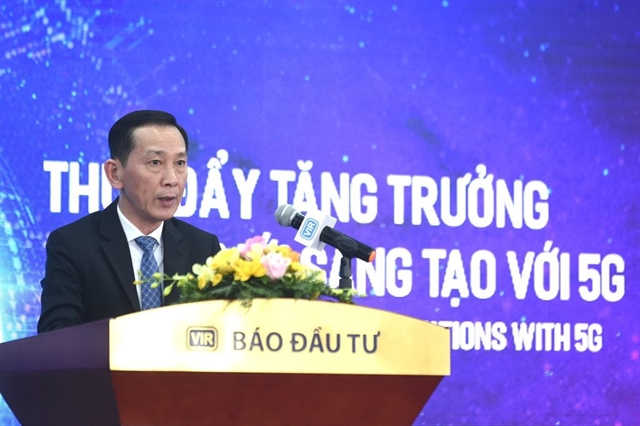The contribution rate of 5G to Vietnamese GDP growth is forecast to reach 7.34 per cent by 2025.

The contribution of 5G to Vietnamese GDP growth is forecast to reach 7.34 per cent by 2025, shown by research of the National Institute of Information and Communications Strategy at an online forum on digital transformation yesterday.
The online forum titled "Digital Transformation - Driving Growth and Innovations with 5G" was organised by the Viet Nam Investment Review Newspaper in Ha Noi.
The digital economy is growing very quickly around the world, becoming the key for many economies to reach out globally.
In Viet Nam, despite being heavily affected by the pandemic, the digital economy is expected to reach US$21 billion this year, up 31 per cent over last year, equivalent to Malaysia and only behind Indonesia and Thailand.
The document of the 13th National Party Congress determined that the digital economy will account for 20 per cent of GDP by 2025 and 30 per cent by 2030.
Speaking at the forum, Vo Thanh Thong, Deputy Minister of Planning and Investment, said that digital transformation has become even more urgent when the COVID-19 pandemic has impacted and changed people's lives and habits, causing unprecedented difficulties and challenges, which forces organisations, individuals and even State management agencies to change and adapt.
The Ministry of Planning and Investment has closely co-ordinated with stakeholders, especially the Ministry of Science and Technology, and the Ministry of Information and Communications in jointly researching, advising, proposing and implementing solutions to promote the process of digital transformation and innovation of Vietnamese enterprises.
Le Trong Minh, Editor-in-Chief of Viet Nam Investment Review Newspaper, said that 5G was considered an important tool to promote digital transformation in all fields.
Many business models, even entirely new industries and services, are emerging and replacing traditional ones with the help of new technologies.
5G will have a strong impact on the global economy, estimated to create $13.1 trillion and two million new jobs by 2035, said Minh.
With favourable foundations both in terms of the legal corridor being gradually completed and the awareness of businesses and people about the essentials of digital transformation, 5G has strong potential for development in Viet Nam, Minh noted.
In the coming years, it would become a foundation for innovation and growth, he added.
Vu Quoc Huy, director of the Viet Nam National Innovation Centre (NIC), said that digital transformation did not just stop at the application of information technology, but in fact it was a complete change in thinking, perception and ways in which a business or an apparatus operates.
For businesses, it was also necessary to have a long-term vision in implementing digital transformation, he noted.
The project of the Ministry of Planning and Investment in collaboration with USAID is also consulting and orienting for 100 businesses on digitalisation, not only digitising information but more importantly, building operation processes to manage the business based on database exploitation and analysis.
Denis Brunetti, President & Head of Vietnam, Myanmar, Cambodia & Laos, Ericsson said: "As a technological age, we are moving into a new space of connected machines, vehicles, wearables and many other things. From within these spaces, entire new enterprises and business models will emerge and deliver new value opportunities across manufacturing, transport, healthcare, energy and more. 5G will unlock the potential of the Fourth Industrial Revolution in Viet Nam.”
“Given Viet Nam’s ambitions for digitising society, we expect 5G to play a fundamental role by increasing broadband connections, improving rural coverage thus bridging the digital divide, enabling Industry 4.0 and increasing contribution of digital communications sector to Viet Nam’s GDP. A key component of Viet Nam's socio-economic development strategy is the digital economy, which will contribute 7 per cent of GDP in 2025 and 7.5 per cent by 2030,” he added.
Commercialising 5G next year
The Ministry of Information and Communications targeted to officially license 5G commercialisation next year, said Nguyen Phong Nha, Deputy Director of the Viet Nam Telecommunications Authority (VNTA) under the Ministry of Information and Communications.
Nha said that the ministry has determined that Vietnamese telecommunications must go along with developed countries in the world in research, deployment and application of new technologies, including 5G mobile networks.
The Ministry of Information and Communications has directed telecommunications units and businesses to deploy many solutions. Accordingly, regarding frequencies, it has submitted to the Government for promulgation Decree No 88/2021/ND-CP on the collection of fees for granting the right to use radio frequencies, auction, licensing and transfer of the right to use radio frequencies.
The ministry has also promoted and guided mobile telecommunications businesses to test 5G technology and services. Accordingly, telecommunications businesses such as Viettel, VNPT, and MobiFone have now tested 5G in 16 provinces and cities.
Especially, for telecommunications infrastructure, the ministry set a goal of 100 per cent of villages to be covered with fiber optic broadband by 2025.
Nha noted that the Ministry of Information and Communications aimed to officially license 5G commercialisation next year and soon cover high-tech industrial parks and areas with high demand for use.
“This is the determination of the information and communication industry in bringing Viet Nam along with leading countries in 5G. In the future, VNTA will continue to strengthen co-ordination with telecommunications units and businesses to urgently summarise and evaluate the testing process of 5G networks, develop criteria for coverage and quality for granting licenses; push solutions on using common infrastructure to save investment costs; improve efficiency in network use and exploitation, and master 5G technology through the use of Make-in-Viet Nam equipment," said Nha. — VNS





